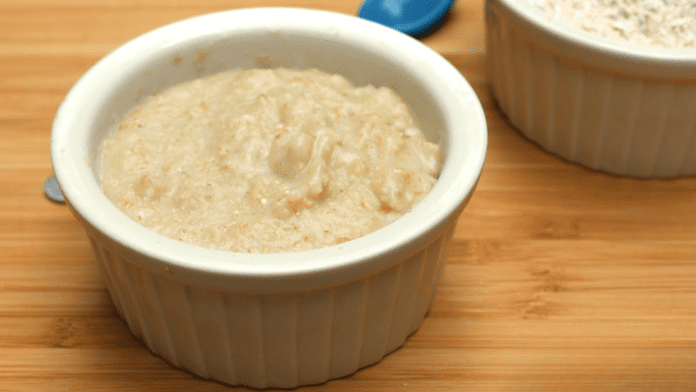As parents, we always want the best for our babies, especially when it comes to their nutrition and overall health. Introducing solid foods to your baby’s diet is a crucial milestone, and choosing the right first food is essential for their well-being. Pediatricians worldwide recommend oatmeal as an ideal choice for a baby’s initial solid food. This article delves into the numerous benefits of oatmeal for infants, its nutritional value, and why it is the top pick among healthcare professionals. Read on to discover how oatmeal can contribute significantly to your baby’s healthy development and set them on the path to a lifetime of good eating habits.
Nutritional Profile of Oatmeal:
Oatmeal is a highly nutritious grain packed with essential nutrients necessary for a growing baby. It is an excellent source of complex carbohydrates, providing a steady release of energy to support their active lifestyles. Moreover, oatmeal contains fiber, both soluble and insoluble, promoting healthy digestion and preventing constipation, a common issue in infants transitioning to solid foods.
Oatmeal is also rich in vitamins and minerals like iron, zinc, magnesium, and B-vitamins, which are vital for the development of a baby’s brain, nervous system, and overall growth. These nutrients are especially crucial during the early stages of life when rapid growth and cognitive development occur.
Furthermore, oatmeal is gluten-free, making it a suitable option for babies who may have sensitivities or allergies to gluten-containing grains. Its hypoallergenic nature reduces the risk of adverse reactions, making it gentle on their sensitive digestive systems.
Easy to Digest:
One of the primary concerns when introducing solid foods to babies is their ability to digest and tolerate new food items. Oatmeal, being a mild and easily digestible food, minimizes the risk of gastrointestinal discomfort for your little one. Its smooth and creamy texture allows for a smooth transition from breast milk or formula to solid foods.
The gentle nature of oatmeal is particularly beneficial for babies with sensitive stomachs, reducing the likelihood of colic and digestive issues. By choosing oatmeal as your baby’s first solid food, you can ensure a seamless introduction to solid foods and make mealtimes an enjoyable experience for both you and your little one.
Low Allergy Risk:
Food allergies can be a significant concern when introducing new foods to babies. Oatmeal has a considerably lower allergenic potential compared to other grains like wheat, barley, or rye, which contain gluten. Gluten is a protein that can trigger allergies and intolerances in some individuals.
Given that oatmeal is naturally gluten-free, it is less likely to cause allergic reactions, making it an excellent option for babies with a family history of gluten sensitivity or celiac disease. However, cross-contamination can occur during processing or packaging, so it’s essential to choose certified gluten-free oatmeal brands to ensure its safety.
Supports Growth and Development:
The first year of a baby’s life is a critical period for growth and development. Oatmeal plays a vital role in supporting these processes due to its nutrient-rich composition. Iron, for instance, is crucial for the formation of healthy red blood cells and proper cognitive development. Oatmeal’s iron content helps prevent iron-deficiency anemia, a condition common in infants transitioning to solid foods.
In addition to iron, oatmeal contains essential fatty acids, such as omega-3 and omega-6, which are crucial for brain development and overall neurological function. These fats contribute to improved cognitive abilities and enhanced visual acuity.
Moreover, oatmeal is an excellent source of calcium, promoting the healthy development of bones and teeth. Calcium is vital during infancy as bones are growing rapidly and laying the foundation for a strong skeletal structure.
Supports Healthy Weight Management:
Obesity has become a concerning issue even among infants and young children. Establishing healthy eating habits early in life can significantly impact a child’s weight management throughout their lifetime. Oatmeal, being a fiber-rich food, helps create a feeling of fullness and satiety, reducing the chances of overeating and excessive weight gain.
Unlike highly processed and sugary baby foods, oatmeal has a low glycemic index, preventing rapid spikes in blood sugar levels. By stabilizing blood sugar, oatmeal helps maintain energy levels and avoid the irritability often associated with sugar crashes.
Introduction to Textures and Tastes:
Introducing oatmeal as a first solid food also provides an opportunity to acquaint your baby with new tastes and textures. Its smooth consistency is perfect for babies just beginning to eat solid foods, allowing them to explore new sensations and learn how to swallow and chew.
Offering oatmeal with various pureed fruits or vegetables can add delightful flavors and provide a broad range of nutrients. This early exposure to diverse tastes can contribute to the development of a more adventurous eater later in life.
Preparation and Feeding Tips:
When introducing oatmeal to your baby, it is crucial to choose plain, unflavored varieties without added sugars or salt. It is best to start with a small amount and gradually increase the portion as your baby becomes accustomed to the new food. Mixing oatmeal with breast milk or formula can make it more familiar and appealing to them.
Always watch for any signs of allergies or adverse reactions after introducing any new food. In case of any concerns, consult your pediatrician.
Final Thoughts:
Oatmeal stands out as an ideal choice for a baby’s first solid food, endorsed by pediatricians worldwide. Its impressive nutritional profile, ease of digestion, low allergy risk, and support for healthy growth and development make it a top pick for healthcare professionals and parents alike. By introducing oatmeal early in your baby’s diet, you set the stage for a lifetime of good eating habits and provide them with a nourishing start to their journey of exploring solid foods. Always remember to consult your pediatrician before introducing any new food and ensure your baby’s well-being every step of the way.





